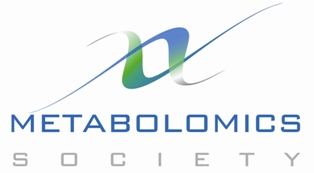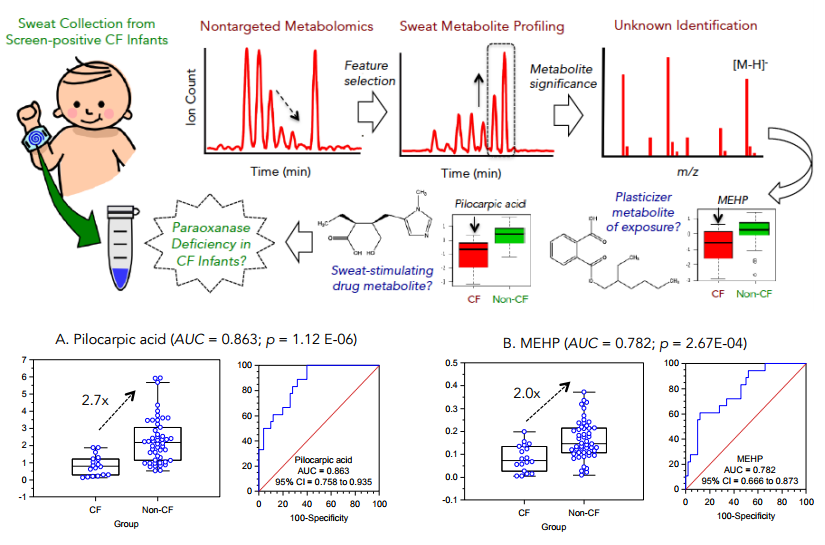
TMIC and the Metabolomics Society
Issue 75 - November 2017
CONTENTS:
Online version of this newsletter:
http://www.metabonews.ca/Nov2017/MetaboNews_Nov2017.htm

 |
| Published
in partnership between TMIC and the Metabolomics Society Issue 75 - November 2017 |
|
CONTENTS: |
|
|
 |
| TMIC
Services |
 |
Metabolomics Society News |

| |
Metabolomics
Spotlight
|

 |
Metabolomics
Current
Contents
|
Metabolomics
Events
|
| 6-8 Nov
2017 |
Metabolomics with the Q Exactive Venue: Birmingham Metabolomics Training Centre, School of Biosciences, University of Birmingham, Birmingham, UK This three-day course will introduce you to using the Q Exactive mass spectrometer in your metabolomics investigations. The course is aimed at students and researchers with minimal previous experience of applying LC-MS in metabolomics. The course will be led by experts in the field and include lectures, laboratory sessions and computer workshops to provide:
Bursaries are now available for PhD students funded by the BBSRC, MRC, or NERC. For further information and registration details, please visit http://www.birmingham.ac.uk/facilities/metabolomics-training-centre/courses/q-exactive.aspx or contact bmtc@contacts.bham.ac.uk. |
| 7-10 Nov
2017 |
Hands on Data Analysis for Metabolic Profiling Venue: Imperial International Phenome Training Centre, Imperial College London, UK Earlybird: £900 Standard: £1100 This 4-day course provides a comprehensive overview of data analysis for metabolic profiling studies with data acquired from NMR spectroscopy and Liquid Chromatography-Mass Spectrometry. It combines lectures and tutorial sessions to ensure a thorough understanding of the theory and practical applications. Day 1: Introductory lectures and tutorials regarding the pre-processing of data acquired via NMR and LC-MS. Day 2: Lectures and tutorials introducing exploratory chemometrics approaches, including PCA. Day 3: Lectures and tutorials covering advanced chemometrics techniques including PLS and Orthogonal PLS. Day 4: The next step - computational tools to aid metabolite identification and pathway analysis. For more information, visit http://www.imperial.ac.uk/imperial-international-phenome-training-centre/courses/hands-on-data-analysis-for-metabolic-profiling/. |
| 13-17 Nov
2017 |
Hands-on LC-MS for Metabolic Profiling Venue: Imperial International Phenome Training Centre, Imperial College London, UK Earlybird: £1750 Standard: £1950 This week long course covers how to perform a metabolic profiling experiment from start to finish. It will cover study design, sample preparation, the use of mass spectrometry for global profiling, targeted methodologies and data analysis. Day 1: Introductory lectures in mass spectrometry and chromatography, study design and sample preparation, followed by preparation of biological samples for analysis on subsequent days. Days 2 and 3: Analysis of biofluids through global profiling and targeted analyses; an introductory session to liquid chromatography, followed by sessions on each of the newest QToF and TQ instrumentation. Instrument set up, method development and acquisition will be covered. We have set a maximum of 3 attendees per instrument allowing for hands-on participation by all. Day 3 finishes with introduction to data analysis. Day 4: Data analysis workshops where attendees will process the data acquired from the previous days, mixed with further statistics lectures, allowing for development of interpretation skills. Day 5: Application lectures, tips, tricks and troubleshooting, optional trip to the MRC-NIHR National Phenome Centre. For further information, please visit http://www.imperial.ac.uk/imperial-international-phenome-training-centre/courses/hands-on-lc-ms-for-metabolic-profiling/. |
| 20-27 Nov
2017 |
2nd International Electronic Conference of Metabolomics (IECM-2) Venue: Held online Building in the success of the 1st International Electronic Conference of Metabolomics (IECM-1) in 2016, Metabolites (ISSN 2218-1989), a peer-reviewed, scientific journal, edited by MDPI AG, is proud to be the organizer and sponsor of the second International Electronic Conference on Metabolomics. Contributions dealing with any discipline promoting metabolism and metabolomics will be welcomed. The conference will be held online (http://sciforum.net/conference/iecm-2) from 20–27 November 2017, enabling you to present your latest research to the scientific community and to have the opportunity to participate in fruitful exchanges of information with academic and industrial groups from all over the world. It is absolutely free of charge to participate as an author or a visitor; all you need to do is create an account on the home page. After the event, proceedings from the conference (abstracts) will be published in the online open access journal, Proceedings. On behalf of our active scientific committee and dynamic editorial staff, we warmly invite you to join us at the second International Electronic Conference on Metabolomics and we look forward to posting your contribution. Sincerely yours, A/Prof Peter J Meikle Chair of the 2nd International Electronic Conference on Metabolomics Editor-in-Chief of Metabolites (ISSN 2218-1989) NHMRC Senior Research Fellow Program Head, Metabolism Head, Metabolomics Laboratory Baker IDI Heart and Diabetes Institute 75 Commercial Road, Melbourne VIC 3004 E-Mail: peter.meikle@bakeridi.edu.au Website: www.bakeridi.edu.au For further information, please visit http://sciforum.net/conference/iecm-2. |
| 1 Dec
2017 |
Introduction to Metabolomics for the Clinical Scientist Venue: Birmingham Metabolomics Training Centre, School of Biosciences, University of Birmingham, Birmingham, UK This one-day course in partnership with the Phenome Centre Birmingham will provide clinicians with an overview of the metabolomics pipeline, highlighting the benefits of the technique to the medical field. The course will provide an:
For further information and registrations details, please visit http://www.birmingham.ac.uk/facilities/metabolomics-training-centre/courses/introduction-metabolomics.aspx or contact bmtc@contacts.bham.ac.uk. |
| 6-8 Dec
2017 |
Multiple biofluid and tissue types, from sample preparation to analysis strategies for metabolomics Venue: Birmingham Metabolomics Training Centre, School of Biosciences, University of Birmingham, Birmingham, UK This 3-day course will provide a comprehensive overview of dealing with complex biological samples for LC-MS analysis. The course is targeted towards students and researchers who are actively applying metabolomics in their research. The course will be led by experts in the field and include:
For further information and registration details, please visit http://www.birmingham.ac.uk/facilities/metabolomics-training-centre/courses/sample-analysis.aspx or contact bmtc@contacts.bham.ac.uk. |
| 11-13 Dec
2017 |
MetaboMeeting 2017 Venue: University of Birmingham, UK Make plans to attend the 10th successful MetaboMeeting conference. The meeting will bring together research scientists and practitioners from all areas of application and development of metabolic profiling, covering a wide range of experience from early career scientists to experts from throughout the international metabolomics field. MetaboMeeting 2017 continues to highlight the work of its attendees through both oral platform presentation and poster sessions. The deadline for oral presentation abstracts is 15th July 2017. The deadline for poster abstracts is 1st October 2017. For further information, visit http://metabomeeting2017.thempf.org/. |
| 14 Dec
2017 |
Free Practical Course - PhenoMeNal e-infrastructure: taking metabolomics data processing and analysis to the cloud Venue: University of Birmingham, UK No registration cost. Register here. |
| 14-15 Dec
2017 |
Metabolite identification with the Q Exactive and LTQ Orbitrap Venue: Birmingham Metabolomics Training Centre, School of Biosciences, University of Birmingham, Birmingham, UK This two-day course will provide a hands-on approach to teach the latest techniques and tools available to perform metabolite identification. We will apply these tools on the Q Exactive and LTQ Orbitrap mass spectrometry family. The course is targeted towards students and researchers who are actively applying metabolomics. The course will be led by experts in the field and include significant hands-on experience using both the Q Exactive and LTQ Orbitrap instruments to perform:
Bursaries are now available for PhD students funded by the BBSRC, MRC, or NERC. For further information and registration details, please visit http://www.birmingham.ac.uk/facilities/metabolomics-training-centre/courses/metabolite-identification.aspx or contact bmtc@contacts.bham.ac.uk. |
| Late 2017
(To be confirmed) |
Metabolic Phenotyping in Disease Diagnosis and Personalised Health Care Venue: Imperial International Phenome Training Centre, Imperial College London, UK Students: £500 Academic: £800 Industry: £1150 A lecture based course detailing an overview of metabolic phenotyping including the use of NMR spectroscopy and Mass Spectrometry, with insights from the experts at Imperial College and collaborators from all over the world. Lectures will cover data acquisition and analysis with some advanced statistical workshops for more hands-on participation for attendees. There will also be examples of real life applications from the research at Imperial College and their collaborators. Day 1: Registration followed by session 1 which will cover an analytical technology (either NMR or MS) for metabolic profiling. A laboratory tour of the facilities will follow. Day 2: Session 2 will cover the alternative analytical technique (NMR / MS) and will be followed by session 3 which will introduce the theory to statistical analysis. Day 3: Session 4 covers more advanced chemometrics, such as OPLS and O2PLS and includes hands-on workshops. Session 5 will introduce metabolite identification in both NMR and MS and cover some tips and tricks to avoid common pitfalls. Day 4: The final day will cover some of the real life applications of NMR and MS for metabolic phenotyping. For further information, please visit http://www.imperial.ac.uk/imperial-international-phenome-training-centre/courses/metabolic-phenotyping-in-disease-diagnosis-and-personalised-health-care/. |
| 8 Jan
2018 |
Metabolomics in Life Sciences Learn about metabolomics principles and their applications in life sciences Venue: Osaka University About this course This course is an introduction to metabolomics principles and their applications in various fields of life sciences. We will provide a summary of all steps in metabolomics research; from experimental design, sample preparation, analytical procedures, to data analysis. The course also provides case studies of various kinds of research samples to attract students that are not familiar with metabolomics, providing them enough explanation to utilize metabolomics technology for their respective research fields. Several examples of metabolomics applications will be introduced throughout the lectures. These include examples within food science and technology, metabolic engineering, basic biology, introduction to imaging mass spectrometry, and application in medical science. No previous knowledge on metabolomics is needed but we recommend that students have an undergraduate-level understanding of Biochemistry, Analytical Chemistry, and Biostatistics, and that they learn about basic principles of multivariable analysis prior to taking this course. For further information, please visit https://www.edx.org/course/metabolomics-life-sciences-osakaux-metab101x. |
| 5-9 Feb
2018 |
EMBO Practical Course on Metabolomics Bioinformatics for Life Scientists Venue: European Bioinformatics Institute (EMBL-EBI) - Wellcome Genome Campus, Hinxton, Cambridge, CB10 1SD, UK Application opens: Friday August 04 2017 Application deadline: Friday November 03 2017 Participation: Open application with selection Contact: Emily Rees Registration fee: £350 including accommodation & food Apply now Overview This course will provide an overview of key issues that affect metabolomics studies, handling datasets and procedures for the analysis of metabolomics data using bioinformatics tools. It will be delivered using a mixture of lectures, computer-based practical sessions and interactive discussions. The course will provide a platform for discussion of the key questions and challenges in the field of metabolomics, from study design to metabolite identification. Audience This course is aimed at PhD students, post-docs and researchers with at least one to two years of experience in the field of metabolomics who are seeking to improve their skills in metabolomics data analysis. Participants ideally must have working experience using R (including a basic understanding of the syntax and ability to manipulate objects). For further information, please visit https://www.ebi.ac.uk/training/events/2018/embo-practical-course-metabolomics-bioinformatics-life-scientists-4. |
Metabolomics Jobs |
This
is a resource
for
advertising
positions in
metabolomics.
If you have a
job you would
like posted in
this
newsletter,
please email
Ian Forsythe (metabolomics.innovation@gmail.com).
Job postings
will be
carried for a
maximum of
four issues
(eight weeks)
unless the
position is
filled prior
to that date.
Jobs
Offered
| Job Title | Employer | Location | Posted | Closes | Source |
|---|---|---|---|---|---|
|
Postdoctoral
Fellowship in
Human
Metabolomics Note: This position is still open |
Cyprus
International
Institute for
Environmental
and Public
Health |
Limassol,
Cyprus |
2-Nov-2017 |
EURAXESS |
|
|
Scientist
(Bioinformatics) |
International
Agency for
Research on
Cancer |
Lyon, France | 31-Oct-2017 | 5-Dec-2017 |
International
Agency for
Research on
Cancer |
|
Postdoctoral
Researcher in
(Bio)Informatics/Statistics |
The
Institute for
Molecular
Medicine
Finland (FIMM) |
Helsinki, Finland | 26-Oct-2017 | 12-Nov-2017 |
University
of Helsinki |
|
Engineer/Data-Scientist
in
Metabolomics
and Lipidomics |
Institute
of
Cardiometabolism
and Nutrition
(ICAN) |
Paris, France | 10-Oct-2017 | Institute of Cardiometabolism and Nutrition | |
| Head
of Business
Development
& Sales
North America |
BIOCRATES
Life
Sciences AG |
Innsbruck, Austria | 27-Sep-2017 |
BIOCRATES
Life Sciences
AG |
|
| Business
Development
Manager Pharma
North America |
BIOCRATES Life Sciences AG | Innsbruck, Austria | 27-Sep-2017 | BIOCRATES Life Sciences AG | |
| Regional Business Development Manager North America | BIOCRATES Life Sciences AG | Innsbruck, Austria | 27-Sep-2017 |
|
BIOCRATES Life Sciences AG |
| Faculty position in Biological Mass Spectrometry | Michigan State University | East Lansing, USA | 20-Sep-2017 |
Until
filled |
Michigan State University |
|
Ian J. Forsythe Double AB, MSc Editor, MetaboNews Department
of Computing
Science
University of Alberta 221 Athabasca Hall Edmonton, AB, T6G 2E8, Canada Email: metabolomics.innovation@gmail.com Website: http://www.metabonews.ca LinkedIn: https://ca.linkedin.com/in/ian-forsythe-465512128 Twitter: http://twitter.com/MetaboNews Google+: https://plus.google.com/118323357793551595134 Facebook: http://www.facebook.com/metabonews |
This
newsletter is
published in
partnership
between The
Metabolomics
Innovation
Centre
(TMIC, http://www.metabolomicscentre.ca/)
and the
Metabolomics
Society (http://www.metabolomicssociety.org)
for the
benefit of the
worldwide
metabolomics
community.
|